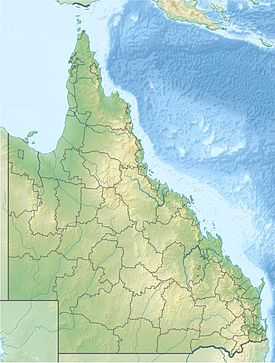Coolmunda Dam
| Coolmunda Dam | |
|---|---|
|
The spillway and gates of Coolmunda Dam | |
 | |
| Country | Australia |
| Location | Darling Downs, Queensland |
| Coordinates | 28°25′51″S 151°13′16″E / 28.43083°S 151.22111°ECoordinates: 28°25′51″S 151°13′16″E / 28.43083°S 151.22111°E[1] |
| Purpose |
|
| Status | Operational |
| Opening date |
|
| Operator(s) | SunWater |
| Dam and spillways | |
| Type of dam | Embankment dam |
| Impounds | Macintrye Brook |
| Height | 20 m (66 ft)[2] |
| Height (foundation) | 16.1 m (53 ft)[3] |
| Length | 2,286 m (7,500 ft)[2] |
| Dam volume | 690×103 m3 (24×106 cu ft)[2] |
| Spillway type | Radial gated[3] |
| Spillway capacity | 6,860 m3/s (242,000 cu ft/s)[2] |
| Reservoir | |
| Creates | Lake Coolmunda |
| Total capacity | 69,000 ML (15×109 imp gal; 18×109 US gal)[3][2] |
| Catchment area | 1,760 km2 (680 sq mi)[3][2] |
| Surface area | 1,645 ha (4,060 acres)[2][4] |
| Max. length | 12 km (7.5 mi) |
| Max. width | 5.9 km (3.7 mi) |
| Normal elevation | 314.7 m (1,032 ft) AHD [3] |
The Coolmunda Dam is an earth–fill embankment dam with a gated spillway across the Macintrye Brook, a tributary of the Dumaresq River, that is located in the Darling Downs region of Queensland, Australia. The main purposes of the dam are for irrigation and potable water supply.[2][4] The impounded reservoir is called the Lake Coolmunda.[1]
Location and features
The dam is located approximately 13 km (8.1 mi) east of Inglewood, just off the Cunningham Highway. Two smaller creeks, Bracker Creek and Sandy Creek, also provide inflows to the reservoir.
Completed in 1968 the earth–fill dam structure is 20 metres (66 ft) high and 2,826 metres (9,272 ft) long. The 690-thousand-cubic-metre (24×106 cu ft) dam wall holds back the 69,000-megalitre (15×109 imp gal; 18×109 US gal) reservoir when at full capacity. From a catchment area of 1,760 square kilometres (680 sq mi), the dam creates Lake Coolmunda at an elevation of 314.7 metres (1,032 ft) above sea level, with a surface area of 1,645 hectares (4,060 acres) at a maximum depth of 16.1 metres (53 ft) when at full capacity. The controlled spillway with radial gates has a discharge capacity of 6,860 cubic metres per second (242,000 cu ft/s).[2] The dam is managed by SunWater.[3][4]
Recreational activities
There is one boat ramp, three picnic areas with good facilities as well as a caravan park.[4] Free bush camping by the lake was once permitted. In 2013, a new camping area was opened to the public.[5]
There are no boating restrictions in place.[4] Parts of the lake contain stretches of standing timber and along the northern bank there are submerged fence posts the demark a former creek bed.[4]
Eel-tailed catfish and spangled perch are found naturally in the lake's waters and the Lake Coolmunda Restocking Group Inc. stocks it with murray cod, silver perch and golden perch.[4] The introduced species european carp has also been found in the lake.[6] A stocked impoundment permit is required to fish in the dam.[7]
See also
- List of dams in Queensland
References
- ↑ 1.0 1.1 "Lake Coolmunda (QLD)". Gazetteer of Australia online. Geoscience Australia, Australian Government.
- ↑ 2.0 2.1 2.2 2.3 2.4 2.5 2.6 2.7 2.8 2.9 "Register of Large Dams in Australia" (Excel (requires download)). Dams information. Australian National Committee on Large Dams. 2010. Retrieved 2 July 2014.
- ↑ 3.0 3.1 3.2 3.3 3.4 3.5 "Coolmunda Dam". Dams: owned or designed by SunWater (PDF). SunWater. 2011. Retrieved 10 July 2014.
- ↑ 4.0 4.1 4.2 4.3 4.4 4.5 4.6 Harrison, Rod; James, Ernie; Sully, Chris; Classon, Bill; Eckermann, Joy (2008). Queensland Dams. Bayswater, Victoria: Australian Fishing Network. pp. 86–87. ISBN 978-1-86513-134-4.
- ↑ "New Lake Coolmunda Camping Area open". Goondiwindi Regional Council. 15 April 2014. Retrieved 6 July 2014.
- ↑ "Coolmunda Dam/Lake Coolmunda". Sweetwater Fishing Australia. Garry Fitzgerald. 2000. Retrieved 26 April 2008.
- ↑ "Do I need a permit to go fishing in a dam?". Department of Agriculture, Fisheries and Forestry. Queensland Government. 5 February 2013. Retrieved 4 July 2014.
External links
- "Coolmunda Dam". Picture Australia. National Library of Australia.
| ||||||||||||||||||||||||||||||||||
